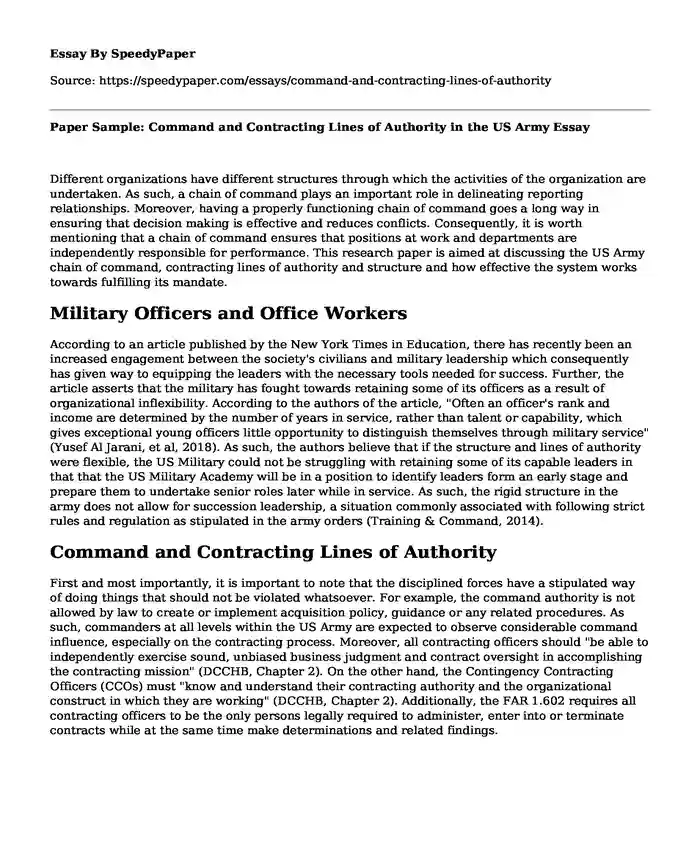Different organizations have different structures through which the activities of the organization are undertaken. As such, a chain of command plays an important role in delineating reporting relationships. Moreover, having a properly functioning chain of command goes a long way in ensuring that decision making is effective and reduces conflicts. Consequently, it is worth mentioning that a chain of command ensures that positions at work and departments are independently responsible for performance. This research paper is aimed at discussing the US Army chain of command, contracting lines of authority and structure and how effective the system works towards fulfilling its mandate.
Military Officers and Office Workers
According to an article published by the New York Times in Education, there has recently been an increased engagement between the society's civilians and military leadership which consequently has given way to equipping the leaders with the necessary tools needed for success. Further, the article asserts that the military has fought towards retaining some of its officers as a result of organizational inflexibility. According to the authors of the article, "Often an officer's rank and income are determined by the number of years in service, rather than talent or capability, which gives exceptional young officers little opportunity to distinguish themselves through military service" (Yusef Al Jarani, et al, 2018). As such, the authors believe that if the structure and lines of authority were flexible, the US Military could not be struggling with retaining some of its capable leaders in that that the US Military Academy will be in a position to identify leaders form an early stage and prepare them to undertake senior roles later while in service. As such, the rigid structure in the army does not allow for succession leadership, a situation commonly associated with following strict rules and regulation as stipulated in the army orders (Training & Command, 2014).
Command and Contracting Lines of Authority
First and most importantly, it is important to note that the disciplined forces have a stipulated way of doing things that should not be violated whatsoever. For example, the command authority is not allowed by law to create or implement acquisition policy, guidance or any related procedures. As such, commanders at all levels within the US Army are expected to observe considerable command influence, especially on the contracting process. Moreover, all contracting officers should "be able to independently exercise sound, unbiased business judgment and contract oversight in accomplishing the contracting mission" (DCCHB, Chapter 2). On the other hand, the Contingency Contracting Officers (CCOs) must "know and understand their contracting authority and the organizational construct in which they are working" (DCCHB, Chapter 2). Additionally, the FAR 1.602 requires all contracting officers to be the only persons legally required to administer, enter into or terminate contracts while at the same time make determinations and related findings.
Conclusion
While command and lines of authority exist in different organizations, the US military is exceptional in that the way duties are aligned and undertaken are strictly adhering to the rules already set (Yoder, 2017). In as much as the established chain of command and lines of authority following a strict structure, it is equally important to highlight that the structure does not allow for succession planning, therefore working to the disadvantage of the US Army (Riley, 2015). There should be in place mechanisms that allow for the young members of the army to be well trained and positioned undertaking future leadership positions. Moreover, the military leadership should be flexible with the sole purpose of ensuring that it is accommodative to the nurturing of young talents for future endeavors.
References
Yusef Al Jarani, Jason Bellet, Austen Boroff, Ethan Dewart, Karsten Fischerm Diego Velasco & Tjada McKenna (2018) "Military Officers and Office Workers". Retrieved from The New York Times http://nytimesineducation.com/spotlight/military-officers-and-office-workers/
Yoder, C. (2017). Defense Contingency Contracting Checklists.Training, U. A., & Command, D. (2014). The US Army operating concept: Win in a complex world. Ft. Eustis, VA, TP, 525-3.
Riley, D. (2015). Contracted Leadership: The Challenges of Military Command within the Arena of Private Contractors.
Cite this page
Paper Sample: Command and Contracting Lines of Authority in the US Army. (2022, Aug 01). Retrieved from https://speedypaper.net/essays/command-and-contracting-lines-of-authority
Request Removal
If you are the original author of this essay and no longer wish to have it published on the SpeedyPaper website, please click below to request its removal:
- Critical Essay Sample of the Movie The Wailing
- Martin Luther's Reforms - Free Essay for You to Check
- Free Essay on the Movie Fight Club Research
- The Theory of Knowledge - Essay Sample on Philosophy
- Essay Example: Idea of Progress in the North American Context
- Research Paper Sample on the Klinefelter Syndrome (XXY)
- Essay Example on Impact of Technology and Social Media on People
Popular categories





